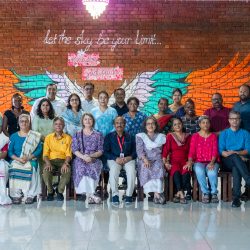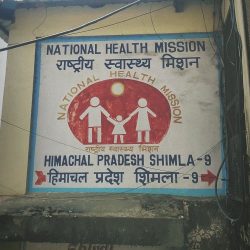A memorable trip to Chatanpara Tribal Village
Dr. Nishu, palliative care physician at Pallium India, writes:
Pallium India’s attempts to understand the health care needs of people living in tribal areas of Trivandrum led to an expedition on 7th April 2019 to Chatanpara, a small tribal village in Vithura panchayat in Trivandrum district. I was lucky to be a part of the medical camp that was held to commemorate World Health Day.
We were a group of 20 that included doctors, nurses, MSWs, admin staff and palliative care assistants. We enjoyed the scenic beauty en route the 90 min drive to our destination and reached around 10.30 a.m. Chatanpara has a small tribal settlement of about 90 houses and these tribes are called Kani tribes. The chief of the tribe called ‘Moopan’ was Echan Kani.

We set up camp in Chatanpara and split into two teams: one for outpatient service and the other to cover home care. I was in the OP team. It took personal visits by our Advocacy manager Babu Abraham to many of the hamlets to get about 20 patients to come to the OP clinic and they were attended to. Most of the ailments noticed were diabetes, hypertension and a couple of cases of cancer. We were surprised to learn that although visits by other organizations including Ayurveda hospital preceded ours, the tribals were not keen on availing these facilities. They have their own traditional medicines with which they managed their minor ailments. The patients comprised of 3 generations and each of them had their own attitude towards seeking healthcare. Whilst the older generation never ever availed health care services even for deliveries, the next generation managed their minor ailments traditionally. The new generation of school/college going youngsters were more informed and receptive to seeking health care facilities.
 It struck me that tobacco was very much part of their lives especially among the older generation. Even women in their early 30s were addicted to this habit. I made them aware of the adverse effects of chewing tobacco but they have become so addicted that I doubt very much if my words had the desired effect. An old lady said she could do without food for a day but couldn’t afford to miss her tobacco.
It struck me that tobacco was very much part of their lives especially among the older generation. Even women in their early 30s were addicted to this habit. I made them aware of the adverse effects of chewing tobacco but they have become so addicted that I doubt very much if my words had the desired effect. An old lady said she could do without food for a day but couldn’t afford to miss her tobacco.
The younger generation, on the contrary, are very well informed and try to induce the elders to kick the habit. Another factor that drew my attention was that generally they were all malnourished perhaps due to ignorance and tobacco chewing. Even a mother who had insufficient breast milk to feed her 3 month old baby didn’t know of formula feeds.
Our home care team visited about 10 houses and they had the same story to tell. It is understood that the team was assisted by 2 natives and the trek to many of the houses was ardous involving steep climb and descent, carrying our medical kits. It involved crossing a stream and guarding against bisons and elephants about which the team was warned.
Most of the families had a thatched hut as well as a proper cemented one provided by the Panchayat, but they preferred to stay in the thatched hut by day and the other one by night. I found this to be rather unique. We were also spellbound by the cleanliness within their houses. Every family had a loyal companion, their friendly dog. Almost every family grew coffee bean, mangoes, jackfruit etc. in their premises.
This trip was truly fascinating for me, rewarding and will remain etched in my memory for a long time to come.




